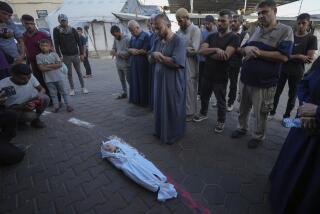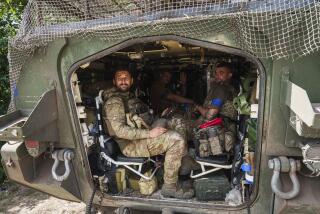Allies Accuse Iraq of ‘Execution Campaign’ : Atrocities: U.S. military says Iraqi soldiers are killing Kuwaiti civilians to destroy evidence of torture.
- Share via
RIYADH, Saudi Arabia — Allied commanders accused Iraq on Saturday of “a systematic campaign of execution” in occupied Kuwait.
“This is terrorism at its finest hour,” said Marine Brig. Gen. Richard I. Neal, U.S. military spokesman in Riyadh, charging that Iraqi soldiers were killing Kuwaiti civilians previously subjected to torture.
“They are executing people on a routine basis, people not connected with the resistance,” he said. “They may think the game is up and they are trying to destroy the evidence (of torture), and that evidence is the people” Neal said.
In Washington, Rear Adm. John (Mike) McConnell, director of intelligence for the Joint Chiefs of Staff, said that analysts estimated that 2,000 to 10,000 Kuwaitis had been arrested and in some cases raped, tortured and mutilated.
“The perpetrators of those crimes will have to answer for it,” said Lt. Gen. Thomas W. Kelly, director of operations for the Joint Chiefs.
In other developments:
* As the noon EST deadline President Bush set for Iraqi dictator Saddam Hussein to withdraw from Kuwait approached and then slipped by unheeded, allied bombers pounded Baghdad and Kuwait with some of the heaviest raids of the war, carrying out 1,200 sorties over Kuwait alone Friday and Saturday.
* McConnell said 300 of Kuwait’s 1,200 oil wells had been sabotaged by Iraqi troops. Approximately 100 of the wells were destroyed, with the fires already burned out, while 200 remained on fire. Iraq contends allied bombing set the wells afire. Heavy plumes of thick black smoke hung over the ravaged emirate, but Kelly said that would not slow allied air or ground operations. He called the oil fires a “spiteful act with very little military significance.”
* Iraq fired a Scud missile at Israel 10 minutes before Bush’s deadline arrived. The missile, the 74th Iraq has shot at civilian targets in Israel and Saudi Arabia since the war began Jan. 17, was shot down by a U.S.-made Patriot missile, resulting in no damage or injuries. Another Scud was fired earlier at eastern Saudi Arabia, but it broke up in midair and fell harmlessly into the desert, allied officers said.
In Kuwait
The Kuwaiti Embassy in Washington released the contents of cabled reports it had received over the past few days. The reports indicate that eyewitnesses in Kuwait believe Iraqi soldiers are under orders to arrest 40,000 Kuwaitis--particularly teen-age boys and men under 40 years old--possibly for use as human shields in anticipation of a ground war.
“Today is another bad day. . . . Nobody is now going out walking or by his car. But we are very much worried of the next step, which might be very soon, and that is that they might come to the houses and take the Kuwaiti citizens from their houses,” one report said.
In Kuwait city, large explosions could be heard over a wide area of the central business district, exiled Kuwaitis in Cairo reported. After speaking by satellite telephone to members of the anti-Iraq resistance in Kuwait city, one of the exiles told Reuters news agency: “They (the Iraqis) seem to have started destroying downtown Kuwait.”
The report could not be independently confirmed.
The embassy also relayed grisly accounts that prisoners have undergone torture, including the gouging out of their eyes, cutting off women’s breasts, plunging drills into prisoners’ bodies and inflicting electric shocks on their feet.
Some have been shot, decapitated or axed to death, according to the accounts.
Meanwhile, these reports said, Iraqi troops are confiscating cars and other items of value, possibly sending them north to Iraq.
In some cases, they are said to be releasing their prisoners for huge ransoms. “Two persons already released in Mishref area after the residents managed to collect 20,000 Iraqi dinars to secure their release,” one cable said. “Many other Kuwait citizens were taken away to unknown destinations, and when their families inquired about their whereabouts, the answer was they were taken to be used as human shield either in Iraq or in strategic locations in Kuwait.”
Saudi Arabia’s ambassador to the United States, Prince Bandar ibn Sultan, said that as many as 8,000 Kuwaitis have been killed since the Iraqi invasion last August, and another 11,000 have been reported missing.
“We believe between 5,000 to 8,000--it’s very hard to confirm until we get there--were killed, mostly by mass execution or punishment . . . or interrogation,” Bandar said.
Saudi and U.S. officials apparently hope that the reports of Iraqi atrocities and oil-field sabotage will work against Hussein’s seeming goal of emerging from the Gulf War as a hero in the Arab world.
“This is a terribly important point in the psychology of the situation,” said a Saudi source in Washington.
The Air War
Before the announcement that the ground war had commenced, allied planes flew through thick antiaircraft fire to drop so much ordnance on targets just outside Baghdad that downtown buildings shook. The raids began before dawn Saturday and continued periodically up to the 8 p.m. (local time) hour of Bush’s deadline.
Of the 2,900 total sorties flown, 100 missions were directed against Iraq’s armored Republican Guard units, a prime target of the air campaign. The crack troops--many of them survivors of the eight-year Iran-Iraq War--are fortified inside southern Iraq, charged with blocking an allied advance into Iraq and reinforcing Iraq’s less-experienced front-line soldiers.
Allied commanders turned loose a wave of their heaviest bombers, the eight-engine B-52s, against a lone Scud launch site Saturday, destroying it and igniting secondary explosions, indicating that additional weaponry had been hit.
There were no allied air losses resulting from combat Saturday, but two Navy helicopters suffered engine failure and were lost at sea. Six crewmen were rescued; one was listed as missing.
In updated figures on Iraqi equipment losses, U.S. military spokesmen said 1,685 of Iraq’s 4,200 tanks had been destroyed, as had 1,485 of its 3,100 artillery pieces and 925 of its 2,800 armored personnel carriers. Hundreds more have been damaged, and Gen. Neal said he believes that Iraq no longer had the capability to maintain or repair its armor.
“I think Iraq just didn’t understand what forces they were going up against,” said one senior U.S. officer. “I don’t think they are professionally or emotionally prepared for what they are experiencing. They are out of their league.”
But Kelly said that while the Iraqi army has suffered “severe losses” during the air war, it is not on the verge of collapse. He said some units may have been 90% crippled, while others remain very effective.
“There are units in the theater of operations that have the capability to resist,” Kelly said. “I do not think that they have the capability to prevail--as a matter of fact, I am certain they don’t. But they do have the capability to persist, and to say that a force of that many men with that many tanks left . . . is on the verge of collapse would be very dangerous.”
Early Ground Action
In a run-up to the full-scale ground war, Marines on Saturday destroyed 33 Iraqi armored vehicles and took more than 200 prisoners.
The Marines also detected traces of chemical weapons that apparently leaked from an Iraqi storage site after it was hit by allied bombers, said Lt. Col. Jan Huly, a spokeswoman.
According to pool reports from the front that were cleared by military censors, Lt. Gen. Walter E. Boomer, commander of the more than 80,000 Marine ground troops in northern Saudi Arabia said U.S. forces on Saturday carried out their deepest raids yet into a no-man’s land between allied and Iraqi ground forces.
The Marines suffered three wounded in the fighting, which Huly said took over 48 hours.
In a pool report from the Associated Press, Huly described the fighting as pitting forward units of the opposing armies, probing to assess each other’s positions.
Eighteen Soviet-made T-62 tanks and 15 other Iraqi vehicles were knocked out, Huly said. Some artillery positions were probably also struck in the hail of artillery, rocket fire and air bombardment, Huly said.
What was described as an Iraqi “covering force” in advance of its main front lines was operating out of trenches and bunkers well-stocked with ammunition and weapons, the spokesman said.
Huly said elements of the 2nd Marine Division had run into “no real hard evidence” that troops opposing them were armed with chemical weapons.
A German-made Fox vehicle, which monitors and analyzes gases, picked up what Huly said was an “insignificant amount” of a chemical agent Friday. He said it posed no threat to the Marines and theorized it may have leaked from an Iraqi storage site hit by the Americans.
In Washington, Kelly issued yet another warning to Iraqi commanders not to use chemical weapons against allied forces, saying they would be held responsible for it whether it’s on the field of battle or later. “I don’t know what all of the legal strictures are,” he said, “but they would be making a real mistake in using them.”
Kelly also said that the Iraqi bunkers captured by two U.S. helicopters earlier in the week contained an assortment of small arms, but no protective gear for chemical or biological attack. He said the sanitary conditions were “quite bad.”
Earlier, Neal said Marines and soldiers had fought a series of sharp border skirmishes that resulted in the destruction of seven Iraqi tanks, several antiaircraft sites and the capture of 143 prisoners. More than 2,100 Iraqis are now in allied hands, and each major engagement of the past two weeks has resulted in a substantial number of Iraqi surrenders.
Allied troops continued to punch holes in the protective sand berm Iraq has built along the border, opening channels through which thousands of men and tanks could pour in an offensive.
American pilots dropped napalm on another Iraqi-built obstacle--the deep, oil-filled trenches situated between the berms and the troop positions. Commanders hope the jellied gasoline, carried in 500-pound bombs, will burn off the oil and melt the pipes that are capable of refilling the ditches.
Throughout the day, as the clock moved toward the deadline for Iraq to comply with the ultimatum to leave Kuwait, allied commanders waited in the underground war room at the Saudi Defense Ministry for some sign that Iraq might intend to withdraw. When none came and the Iraqi Revolutionary Command Council finally issued a statement rejecting the ultimatum, one Saudi shrugged and said, “At least now we know we are entering the beginning of the end.”
Lamb reported from Riyadh and Broder from Washington. Times staff writers Jack Nelson and Karen Tumulty contributed from Washington.
More to Read
Sign up for Essential California
The most important California stories and recommendations in your inbox every morning.
You may occasionally receive promotional content from the Los Angeles Times.










